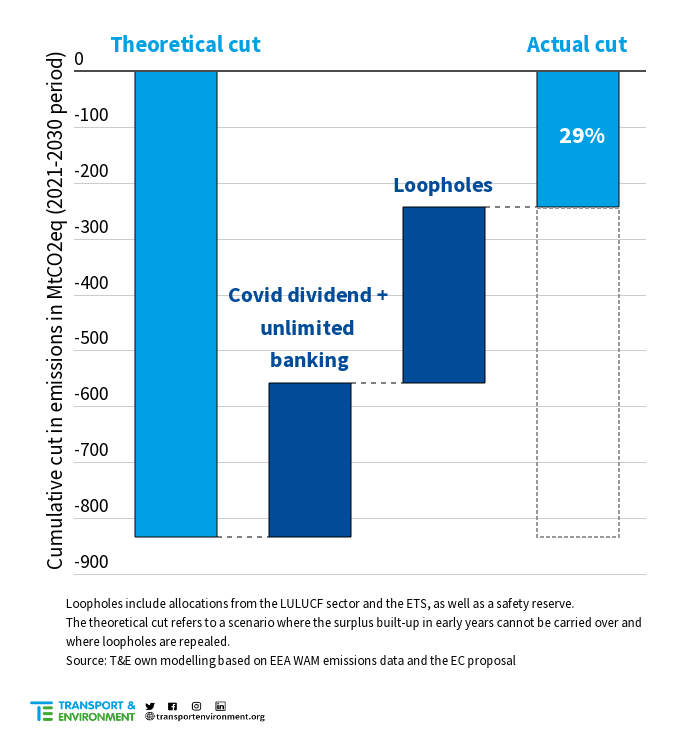The ESR – under review now as part of the European Commission’s ‘Fit for 55’ climate package – sets binding national climate targets for the emissions of road transport, buildings, agriculture, waste and small industries. New T&E analysis finds that the emissions reduction trajectory proposed by the European Commission sets a far too generous emissions budget for 2021-2030. Weaknesses in the Regulation mean that, by 2030, emissions in the ESR sectors would not be cut by -40%, as envisaged by Fit for 55, but by a mere -33%.
Sofie Defour, Climate Manager at T&E, said: “The ESR is meant to be the EU’s safeguard to ensure that member states put in place necessary climate measures. But national targets remain empty shells if not properly implemented and enforced. If the ESR is full of flexibilities and loopholes, member states have an easy way out of their obligations. But the climate does not wait for such opt outs.”
T&E’s new analysis reveals that, with the proposed trajectory, member states would only need to realise 29% of the emissions cuts envisaged by the Commission’ proposal for the 2021-2030 period. Translated to the ESR target for 2030, emissions in the road transport, buildings, agriculture, small industry and waste sector would not be cut by -40% in 2030, but only by -33%.
T&E’s analysis finds two types of flexibilities within the ESR which will prevent the EU from reaching its emissions reduction target. First, the processes of banking, borrowing and trading give room to member states to delay real emission cuts and rely on reductions due to the economic slowdown caused by COVID. Under the current rules, member states can ‘bank’ their 2021 surpluses with no limit for future years. With this so-called ‘COVID dividend’, countries will be able to bank a surplus the size of the entire Czech Republic’s 2019 emissions, in 2021 alone.
The second, and more worrying type of flexibility, consists of credits that are additional to countries’ allocated emissions budgets. They either come from other sectors outside of the ESR (ETSand LULUCF sectors) or as additional allocations provided under the ESR.These loopholes undermine the very goal of the regulation which drives emissions reduction in ESR sectors. By injecting additional permits into the ESR emissions budget, it decreases the incentive formember states to design sufficient measures to ensure that the transport, buildings, agriculture and waste sectors areon a path to net-zero.

“We call for an end to these flexibilities. The European Commission cannot set ambitious targets in itsFit For 55 package, but simultaneously give room for flexibilities that allow member states to dodgethose targets. We propose an alternative trajectory that would improve the ESR’s emissions cuts by244%, compared to the Commission’s proposal. This is the level of ambition we need in Europe,”explained Defour.
“The inflated carbon budget and loopholes are contributing to dangerous climate change as greenhouse gases will continue to be loaded into the atmosphere. It’s vital countries do not delay action, but rather stick to the most ambitious pathway, reducing from real emission levels. Ambitious, steady action would bring the most benefits to society” added Brigitta Bozsó, climate policy coordinator at Climate Action Network (CAN) Europe.
The study also finds that in the past, countries failed to meet their 2013-2020 emissions budget, because of poor enforcement mechanisms. This goes against the overwhelming support bycitizensfor more ambitious national climate targets. T&E, CAN Europe, EEB and WWF recommend a stronger compliance framework, including monetary penalties and improved quality and transparency of corrective action plans.
A coalition of NGOs, including CAN Europe, WWF and the EEB, have come together to propose a series of revisions to the Effort Sharing Regulation, in a bid to strengthen rules on national climate action and planning.

